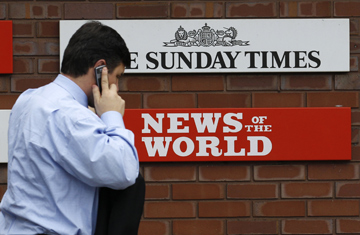
A man passes a sign outside the News International Limited complex, in London January 27, 2011.
When a reporter from Rupert Murdoch's British Sunday paper the News of the World was jailed, along with a private detective, in 2007 for hacking into the cellphone voicemails of aides to the royal family, the paper insisted it was a one-off — a "rogue reporter" operating without the knowledge or approval of his bosses. That assertion prompted two reactions from those in the U.K. newspaper industry: snorts of disbelief — after all, the British tabloids have a reputation for aggressive and occasionally dubious behavior when in pursuit of a story — and a creeping fear that the conviction could spread suspicion and bring the police to the door. Which is why so many were surprised, and some relieved, when Scotland Yard ended its investigation after that single case.
But on Tuesday, the News of the World's current chief reporter, Neville Thurlbeck, and the paper's former news editor, Ian Edmondson, were arrested on suspicion of conspiring to intercept communications, believed to be voicemail messages. The arrests are the first in a new Metropolitan Police investigation into the scandal known as Hackgate, an investigation that threatens not only to reveal how widespread the practice of phone hacking is among British papers, but also that the Met could be complicit.
Even after the case was considered closed in 2007, there were signs that it had been just the tip of the iceberg. Questions were raised by legislators over the seeming reluctance of the Met to widen the original inquiry, suggesting that the police feared a deeper probe would reveal a close relationship between the force and the News of the World, and even that officers had been paid for information by journalists — something the Met has insisted is illegal and not tolerated.
And there were the continuing allegations from celebrities, including actress Sienna Miller and comedian Steve Coogan, and politicians — former prime minister Gordon Brown and his deputy John Prescott among them — that their phones had been hacked by the News of the World and, possibly, other U.K. papers. The affair refused to die, even leading to the resignation in January of Prime Minister David Cameron's spin doctor Andy Coulson, who had been the News of the World's editor at the time of the original offence but always claimed to have known nothing about his reporter's activities.
On Tuesday, those who for the past five years have been demanding a wider inquiry witnessed the first potential breakthrough. Some three months after the police decided to re-open the investigation, Thurlbeck and Edmondson — who was sacked by the paper in January after an internal investigation appeared to link him to phone hacking — turned themselves into the police, their arrests having been based on information supplied by News International, which has always insisted it will root out wrongdoing and aid the investigation at every turn. Thurlbeck and Edmonson are now out on bail.
But perhaps of equal significance to the arrests is a letter that the country's director of public prosecutions, Keir Starmer QC, sent that same day to parliament's Home Affairs Committee, which is running its own investigation into the phone-hacking affair. In the letter, Starmer, who had been asked to give evidence to the Committee as part of their inquiry, appears to flatly contradict statements from the head of the original investigation, acting deputy commissioner of the Met John Yates, that there had not been sufficient grounds to widen the scope of his inquiry.
And for Tom Watson, a member of the opposition Labour party who has led the campaign for a root-and-branch probe into the affair, that is the key to the future direction of the Hackgate investigation. "There will be a lot of pain for the Met to come," he says. "This is now all moving towards looking at the relationship between News International and the Met. After Starmer's written evidence, the Committee will go back to Yates to ask him to explain himself. In my view, the police had plenty of evidence to go further in [the original investigation] and they will now have to come clean about that."
That relationship was thrown under the spotlight in 2003, when then editor of News International's Sun newspaper, Rebekah Brooks, told MPs investigating privacy and the press that her journalists had paid the police for information. That remark has been reviewed in the light of Hackgate and last month the Home Affairs Committee wrote to Brooks, now News International chief executive, asking for full details of who paid what to whom. The MPs want to know, for example, whether Metropolitan police officers were involved. The Met had previously promised to investigate Brooks' claims — although that has yet to produce any results — and it has always insisted it did not widen its original phone-hacking inquiry because there was insufficient grounds to do so.
Meanwhile, both Watson and former Labour deputy prime minister Prescott claimed in parliament last month that the hacking went beyond the News of the World to its stablemates the Times of London and the Sunday Times.
Now with something to prove, the Metropolitan Police will likely delve much deeper and range much wider with this investigation than the original 2007 inquiry. And those in both the newspaper industry and in Scotland Yard who worry that there may be implications way beyond a single paper or profession may find their fears justified.
